Religion 8
Pilgrimage to El Rincón

Pilgrimage to El Rincón
By Claudio Pelaez Sordo
December 17, 2020
Translated and edited by Walter Lippmann for CubaNews.
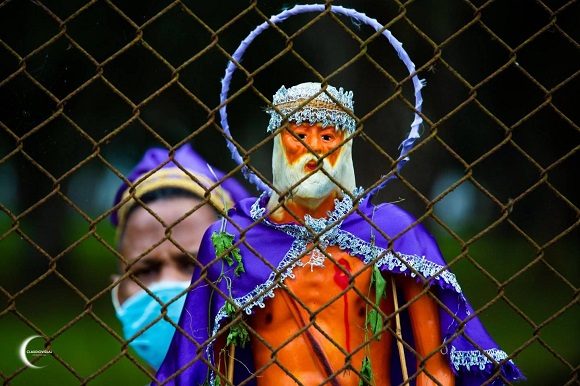
Celebration for St. Lazarus Day. Photo: Claudio Peláez Sordo.
Today part of the Cuban people celebrate the day of Babalú Ayé, popularly known as Saint Lazarus, one of the most miraculous saints according to popular culture and venerated for being the guardian of the most dispossessed and sick.
Through the lens of Claudio Pelaez we know the journey to the sanctuary “El Rincon”, in Santiago de las Vegas, where thousands of faithful of Saint Lazarus arrived. The usual pilgrimage, which is already part of the Cuban identity, was marked on this occasion by faces covered with masks due to the context of the COVID-19.
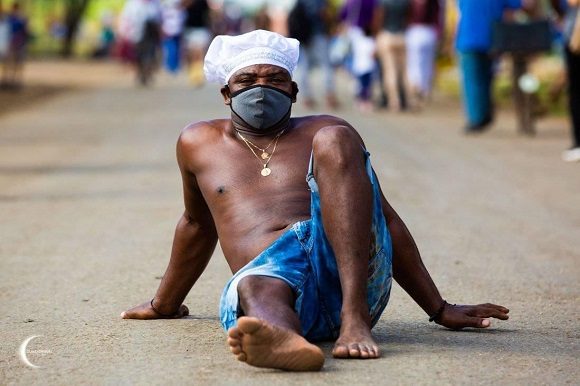
Anyway, I get to the Corner. Photo: Claudio Peláez Sordo.
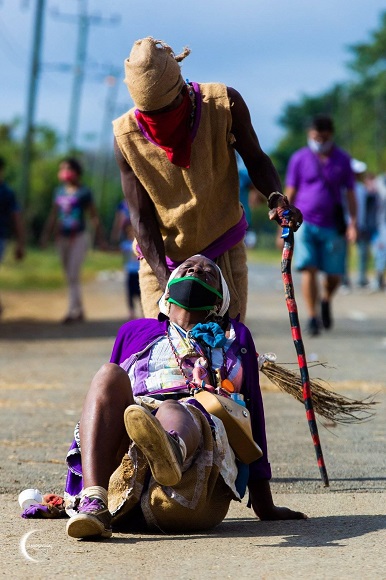
Between the two of us we arrived at the Rincón. Photo: Claudio Peláez Sordo.
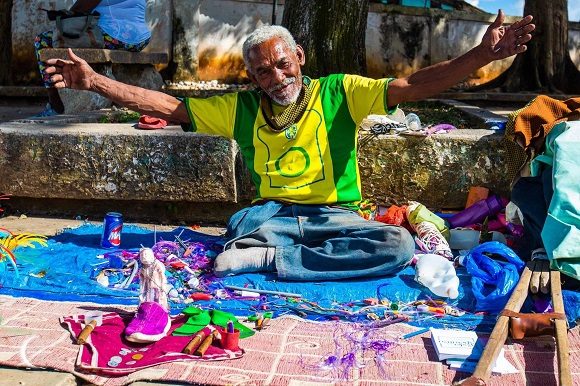
Very happy to celebrate this day. Photo: Claudio Peláez Sordo.
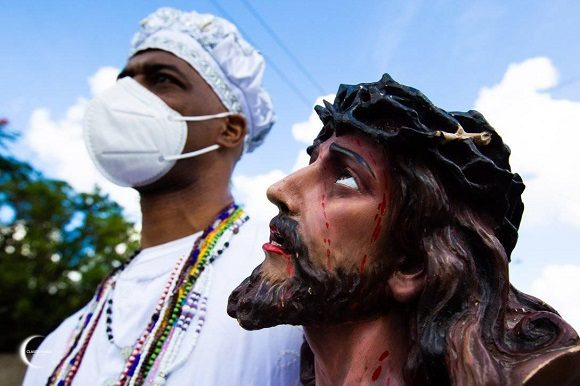
Lazarus is our favorite deity. Photo: Claudio Peláez Sordo.
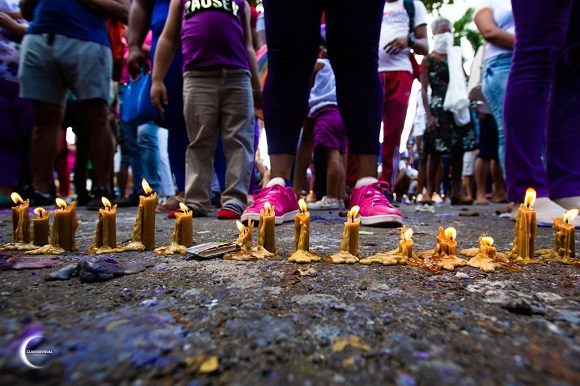
This pilgrimage is an expression of Cuban identity. Photo: Claudio Peláez Sordo.
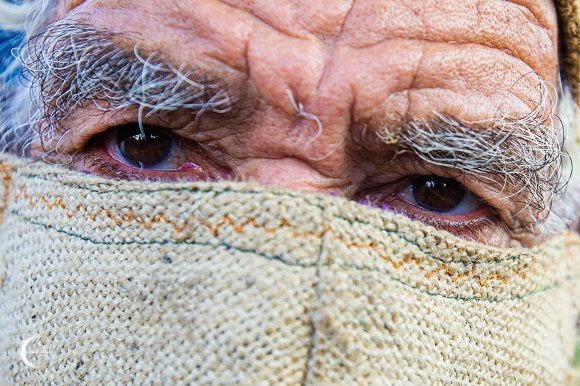
We carry Lazarus deep inside. Photo: Claudio Peláez Sordo.
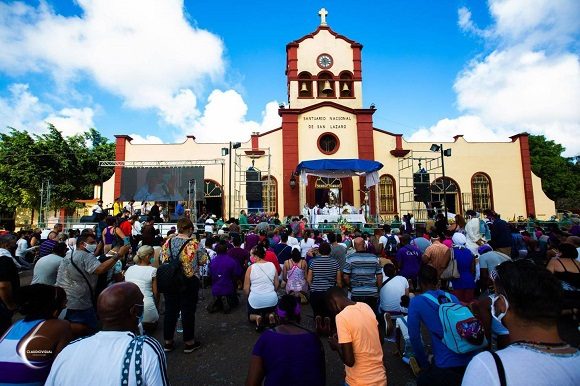
Special moment to gather together the deserved homage to the saint who watches over them and protects them. Photo: Claudio Peláez Sordo.
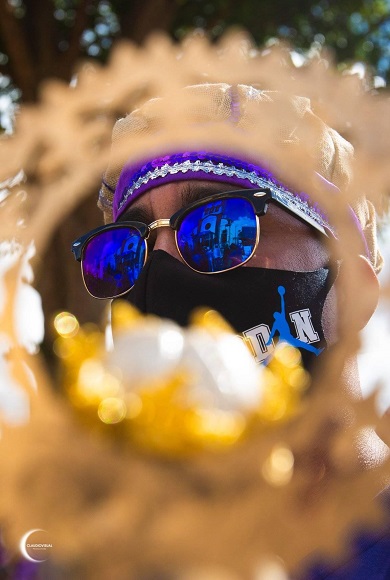
Cult of Saint Lazarus, solid expression of Cuban identity. Photo: Claudio Peláez Sordo.

Any sacrifice is little to venerate Lazarus. Photo: Claudio Peláez Sordo.
Refutation of Religious Fundamentalism
Refutation of Religious Fundamentalism

By Manuel E. Yepe
http://manuelyepe.wordpress.com/
Exclusive for the daily POR ESTO! of Merida, Mexico.
Translated and edited by Walter Lippmann.
According to the German sociologist, philosopher, economist, jurist, historian and political scientist Max Weber, considered one of the founders of the modern study of sociology and public administration, Protestantism is one of the foundational elements of the origin of capitalism.
Based on this same logic of development, it is evident that the reactionary and traditional neo-Pentecostal church – born in and exported by the United States – is a fundamental part of the current neoliberal phase of capitalism. It promotes the non-intervention of the State in society, is in favor of the cruelest individualism, alien to all social solidarity and which even privileges religious control even over the health of the population.
This is approximately how Jorge Elbaum, doctor of economics, sociologist, researcher, teacher, journalist and poet, sees it in his article “Shepherds of the Virus”.
The model of the charismatic mass pastors was exported by the United States to Latin America in the 1970s to weaken Liberation Theology, a current of the Catholic Church committed to the destiny of the poorest.
Pastor Gerard Glenn, a leader of the New Deliverance Evangelistic congregation in Richmond, challenged recommendations of social isolation by stating that “God is greater than this dreaded virus” and warned that he would not consent to the temporary closure of his church. “I’m essential as a preacher because I talk to God,” he said. Glenn died last March 22 from a coronavirus, but his wife is still fighting the disease.
The same fate befell Landon Spradlin, leader of Virginia’s evangelical community, who became a staunch defender of Donald Trump’s tenets. On March 25, he died at age 65, shortly after claiming that the quarantine was basically aimed at “manipulating the lives of American citizens” and that its communication through the media was producing “unnecessary terror.
In mid-April, Life Way Christian Resources of Tennessee published the results of a survey on pastors’ perceptions of the pandemic: 81 percent of those surveyed said that “the love of many believers is dissipating as a result of social distancing,” which is why their congregations should be kept open.
In South Korea, the Church of Jesus – known as the congregation of Shincheon, which promotes mass assemblies – became the epicentre of the COVID contagion in that country. Its leader, Pastor Lee Man-Hee, urged his followers to oppose the government’s harsh isolation measures. Sixty percent of the total number of infected people in the country belong to this group.
In crisis situations like the present one, religious fundamentalisms (of all denominations) counterpose human regulations to the law of God, demanding obedience to divine mandates that they supposedly interpret and manage. Their open-minded claims are motivated by expectations of losses in the collection of contributions and tithes from parishioners.
Leaders of denominational orthodoxy believe that lack of income can lead to the failure of their business enterprises. The logical fear generated by the pandemic allows fundamentalist leaders to appeal to apocalyptic discourse and to advise sinners of a return to revealed truth.
In Latin America, the neo-Pentecostal tradition was consolidated by spreading the so-called prosperity gospel, which holds that wealth is a divine gift. Billionaires, for that tradition, are subjects who have been rewarded by the deity and lack responsibility for the inequity they create.
According to their references, they cannot be accused of pettiness because by accumulating wealth they subject the rest of humanity to misery. This ideological position defends sexism and patriarchy, and attacks LGBT identities, feminist movements and/or those who promote the voluntary termination of pregnancy.
May 18, 2020.
This article can be reproduced by quoting the newspaper POR ESTO as the source.
Pandemic and Spirituality

Pandemic and Spirituality
The coronavirus forces us to assume a new spirituality and attitude towards reality. Spirituality is the capacity to open oneself lovingly to the other, to nature and to God.
By Frei Betto
April 11, 2020
Translated and edited by Walter Lippmann for CubaNews.
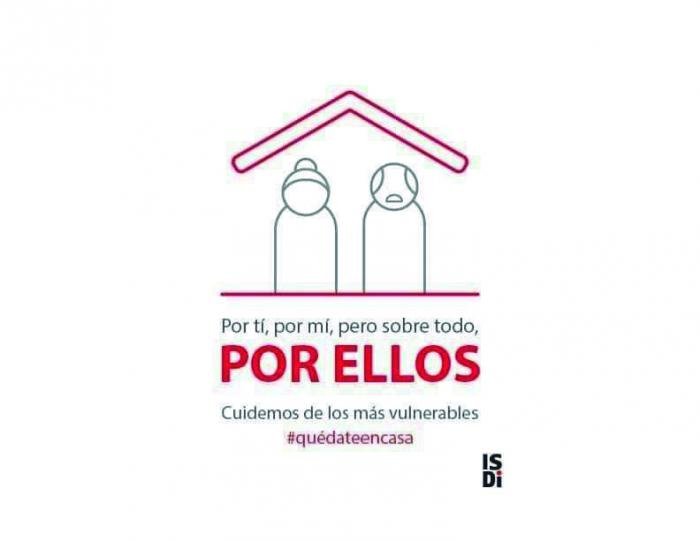
Life is full of contingencies. On a personal level, failure, loss of friends, illness, death. On the global level, events that no analyst or futurologist foresees, such as the fall of the Berlin Wall and the Twin Towers in New York. Nor did anyone suspect that in the midst of the 21st century, with all the resources of science, humanity would be threatened by a pandemic.
Who could have imagined that it would come from China, in the form of a contagious disease, the cause of the deepest crisis of capitalism since 2008? According to the Morgan Stanley Composite Index, in a few weeks in the financial market, the shares of the world’s stock exchanges lost $15.5 trillion dollars, more than eight times the GDP of Brazil in 2019!
Will any of those speculators and mega-researchers be affected in their pockets (the most sensitive part of the human body) have become poorer? And yet, before the pandemic, almost all of them refused to make their own contribution to measures to combat hunger and global warming.
That reminds me of the siege of Jerusalem by the Romans in the year 70. There came a time when the rich man offered a pot full of gold in exchange for a piece of bread.
The coronavirus forces us to assume a new spirituality and attitude towards reality. It does not make class distinctions, as does gastroenteritis, which kills thousands of malnourished children. Likewise, it makes no distinctions of sexual orientation, as does AIDS, which affected mostly homosexuals. Now we are all vulnerable, even if the age groups and situations of risk vary.
We are all forced to withdraw into the house and into ourselves, to become detached. This abandonment of routine activities and programmed agendas can uproot or humanize us. Those who are attached to certain habits that, for the moment, are forbidden, such as going to the movies, to the theater, to the club, will rebel. In the case of the elderly, they will not be able to have contact with their grandchildren and will have to stay at home as long as possible.
Air travel has been reduced, national borders have been closed, tourist tours have been canceled. We have no choice but to stay put where we are. Huit-clos [no exit], within four walls. We may discover, like Sartre, why others are hell. And it may be that we rescue family life, dialogue with the family, the care of the house (everything must be sanitized).
It is time to learn to work and study without leaving domestic space. Now we have more time to watch movies on TV, surf the internet, read good books, do research, meditate and pray.
The virus makes everyone equal. But it doesn’t level the playing field. The bourgeois couple, who never took the trouble to go into the kitchen or clean the house, are now forced to roll up their sleeves or risk having one of their employees bring the virus into their home. The recalcitrant does not follow the instructions of the health authorities, and the selfish buy all the alcohol gel and masks in the pharmacy.
I know a young woman who volunteered to do the shopping for the vulnerable neighbors in her building without charging anything for it. Another distributed her phone number so that isolated elderly people would have someone to talk to. A married couple of lawyers go in their car every morning to pick up their cook on the outskirts and take her back in the afternoon, to prevent her from using public transportation. Three neighboring families from a hospital decided to prepare lunches for the nurses and doctors who double their work hours. In Italy, neighbors look out the window in the late afternoon and sing in chorus. Churches, mosques, synagogues open their doors to those who live on the streets and need hygienic care. Finally, there are countless examples of generosity and solidarity in this period when we are all potentially threatened.
These gestures have their source in spirituality, even if it is not of a religious nature. Spirituality is the capacity to open oneself lovingly to others, to nature and to God. And its best teaching is in generosity, the secret of happiness. Rich is not he who has everything, said Buddha, but he who has need of little.
Nicaraguan Poet Ernesto Cardenal Dies

Nicaraguan Poet Ernesto Cardenal Dies
March 1, 2020
Translated and edited by Walter Lippmann for CubaNews.
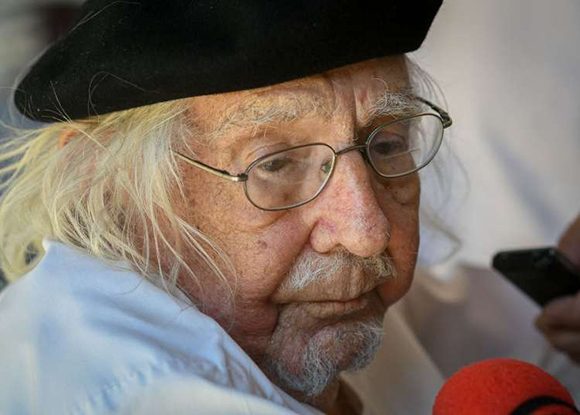
The poet Ernesto Cardenal. Photo: Confidential.
The poet Ernesto Cardenal died this Sunday afternoon in Managua at the age of 95. The priest was suffering from heart and kidney problems and had been hospitalized for a few days.
Nicaragua and Latin America are losing their greatest literary reference after Ruben Dario.
“I am a poet, a priest and a revolutionary”, was what defined the man who, in 2012, was admonished by Pope John Paul II for making a revolution together with the Sandinista Front for National Liberation (FSLN).
Cardinal, born in the colonial city of Granada in January 1925, was a poet, priest, theologian, writer, translator, sculptor and politician. His poetic work won him several international awards. In 2012 he received the Queen Sofia Award for Ibero-American Poetry. He was one of the most outstanding defenders of liberation theology in Latin America.
On February 4, 1984 -in the framework of the Cold War- Pope John Paul II imposed the suspension ad divinis (prohibition to administer the sacraments) to the priests Ernesto Cardenal, Fernando Cardenal (the poet’s brother), Miguel D’Escoto and Edgard Parrales due to their attachment to liberation theology. Thirty years later, on August 4, 2014, Pope Francis ordered that D’Escoto’s punishment be lifted, and Cardinal on February 17, 2019.
He poured his essence into his verses: the desire of women in his Epigrams, the concern about God, his revolutionary spirit in his poems against the Somoza dictatorship, his psalms, the conviction of social justice, and the famous Prayer for Marilyn Monroe.
On Monday, a mass will be held in Managua’s cathedral and the funerals will take place in Solentiname, an island in Nicaragua’s Great Lake where the writer, theologian and sculptor founded a community of peasants, painters and poets in the 1970s in support of the Sandinista Front.
(With information from La Pagina)
==================
Ernesto Cardenal: on Fidel: He is Not a Simple Character
For those of us who have known Fidel Castro (and love and admire him) it is difficult to give a brief portrait of him. Because contrary to what those who only know him from the newspapers (often hostile to him) may think, he is not a simple character to define, but a highly complex one.
FULL: https://walterlippmann.com/ernesto-cardenal-on-fidel/
Emma Thompson: “I’m an Atheist”
El País [Spain] Emma Thompson: “I’m an Atheist Because Religion Oppresses Women
The acclaimed actress continues to fight for wage equality and transparency in the industry of which she is a part
By ROCÍO AYUSO
November 24, 2018
Translated and edited by Walter Lippmann for CubaNews.

Emma Thompson, during the premiere of ‘The Verdict’ last August GTRESONLINE
Emma Thompson is good at everything she does. She rose to fame as an actress, a passion that earned her an Oscar with Howards End (1992). She also has an Oscar as a writer, adapting Jane Austen’s Sense and Sensibility (1995) to the screen. And as an activist she never shuts up. She fights for equality and transparency in wages in the industry of which she is a part. Moreover, she personally takes on the causes she believes in, as demonstrated by the adoption of Tindyebwa Agaba, formerly a child soldier from Rwanda.
The proximity of the 60’s does not stop this Londoner, a declared atheist and Greenpeace advocate. She went in slippers to her appointment as a lady and whose last job, a Christmas advertisement to which she has given her voice, has been banned from Icelandic television. The spot tells the story of a little orangutan named Rang-tan who walks into a girl’s bedroom after escaping the destruction of the forest by palm oil traders. Thompson, married to fellow actor Greg Wise and mother of a daughter, Gaia, is now releasing The Verdict, a film based on the novel by Ian McEwan in which she plays a British High Court judge who has to make important decisions about her life and that of a child.
QUESTION. As much as you are judged as an actress, are you also judgmental?
ANSWER. Only when you sit in the place of the judges in a courtroom, up there, do you realize how easy it is to judge from that position. How easy it is to feel above everyone.
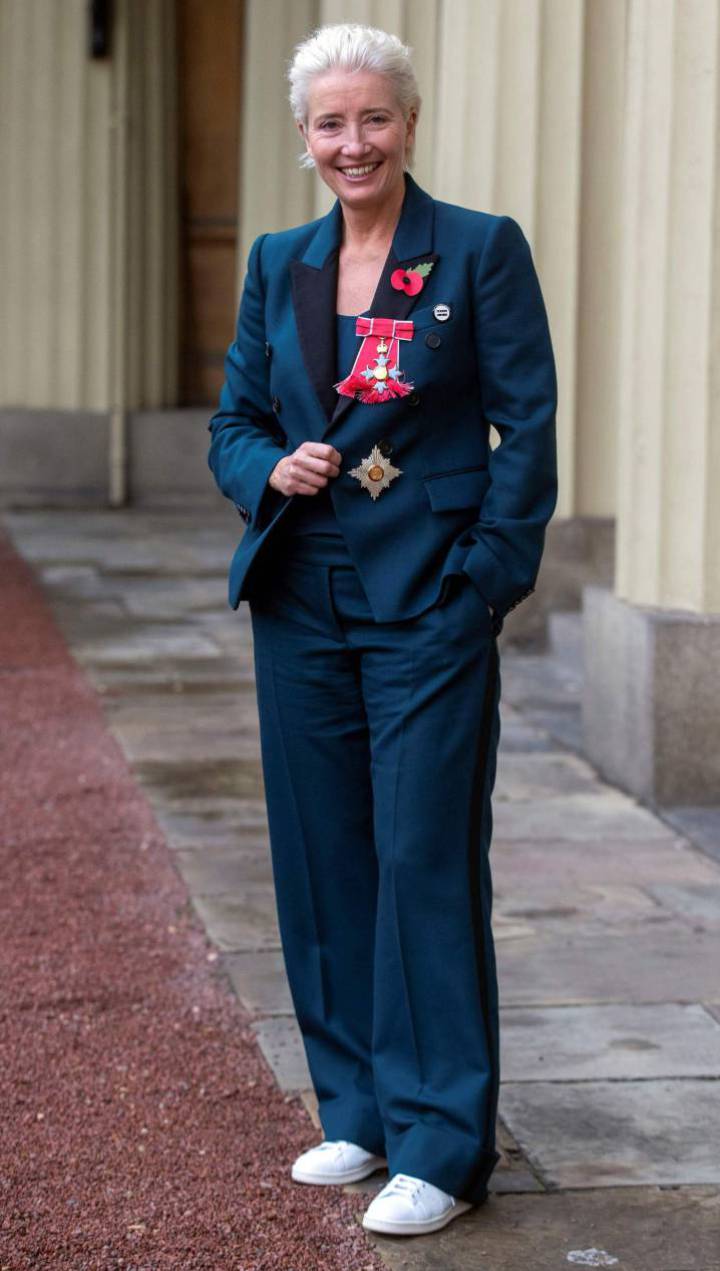
Emma Thompson, on her appointment as Lady of the British Empire, November 8. AFP
Q. And as a star, is it also easy to feel above everyone?
A. I guess it’s easy and I make those mistakes too. But my family takes care of taking me down a peg. When you enjoy a position like mine, it’s good to go shopping for milk once in a while. And I do. I’m sure I’m a bit of a brat or a spoiled brat sometimes. But at home I do the cooking, the shopping, and I’ve cleaned a few bathrooms. I try to keep my feet on the ground, but of course I’m very spoiled because I have a personal assistant without whom it would be impossible for me to do what I do.
Q. This year alone you have collaborated in a television series (Upstart Crow), in a television film (King Lear), you have done several voice works and you have two premieres, Johnny English Strikes Again and now The Verdict. What do you do when you have a couple of hours free?
A. I sleep (laughs). I’d say I go to the movies, but there are no movies that last two hours anymore. I’m not much of a TV watcher either even though I saw The Crown in one sitting. If I have two hours, I read. I like historical novels like Philippa Gregory’s or the work of that great feminist writer Rebecca Solnit.
Q Her defense of equality, of feminism, predates the #MeToo movement. Have things improved in any way?

Emma Thompson, during the climate change march in London, UK, in 2015. G3ONLINE
A. They change and don’t change. Above all, I am a feminist who believes in women’s rights and equality. And it is impossible for me to feel sympathy or faith in any institution that systematically oppresses women. That is why I am an atheist. Because religion has a long history of oppressing women.
Q. One of your latest works has been an announcement for Greenpeace that has reignited the controversy. This is not your first collaboration with the environmental organization.
A. I have a very close relationship with Greenpeace. I have travelled with them twice to the Arctic and next year we will work together again. They are a very effective organization partly because of their political stance, because they don’t mind breaking the law and using civil disobedience if it brings attention to the problems that we are facing. We are as hooked on non-renewable energy as we are on tobacco. And the easiest and quickest solution to many of our problems is a boycott.
Q. The UK is going through a difficult time with the implementation of Brexit. How is it going in the final stretch?
A: The world must think we have lost our minds. The results plunged me into grief because I was born 14 years after the end of World War II. I still remember the feeling of loss in London, in a Europe traumatized by both wars. The idea of breaking up the union makes me sad. But you have to realize that many people are disenchanted with the system. Those who feel ignored by our government or by the union of European countries. So what is born now has to be a new union, a better one. I prefer to think that this is a good time for something new to be born. I take comfort in that thought.
Tribute to Father Sardiñas

Tribute to Father Sardiñas on the 55th Anniversary of his Passing
With the placing of a floral offering in the name of the Cuban people, and a pilgrimage to his tomb in the Colon Cemetary in Havana, Guillermo Isaías Sardiñas Menéndez, the priest known as the Father of the olive green cassock, was recalled yesterday on the 55th anniversary of his death
——————————————————————————–
Author: National Editor | internet@granma.cu
December 24, 2019 01:12:18
A CubaNews translation.
Edited by Walter Lippmann.
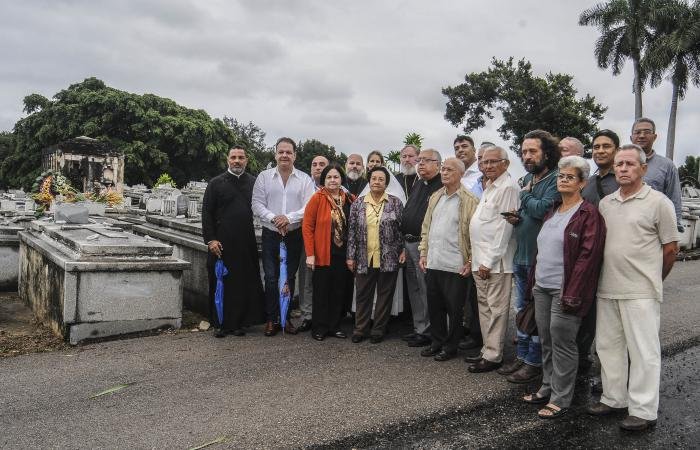
Photo: Dunia Álvarez
With the placing of a floral offering in the name of the People of Cuba and a pilgrimage to his tomb, in the Colon Necropolis, in Havana, the priest Guillermo Isaías Sardiñas Menéndez, known as the Father of the olive green cassock, was evoked yesterday on the 55th anniversary of his death.
Major General José Carrillo Gómez, president of the Association of Combatants of the Cuban Revolution (acrc), highlighted the personality of the former chaplain of the Rebel Army who came down from the Sierra Maestra with the rank of Commander, while Monsignor Ramón Suárez Polcari, chancellor of the Archbishopric of Havana, said a prayer in tribute to this distinguished personality. Also present were Caridad Diego, head of the Office of Attention to Religious Affairs of the Central Committee of the Party, Brigadier General Delsa Esther Puebla Viltre and members of the Association of Combatants of the Cuban Revolution (ACRC), as well as representatives and religious leaders of our country. (National Editor)
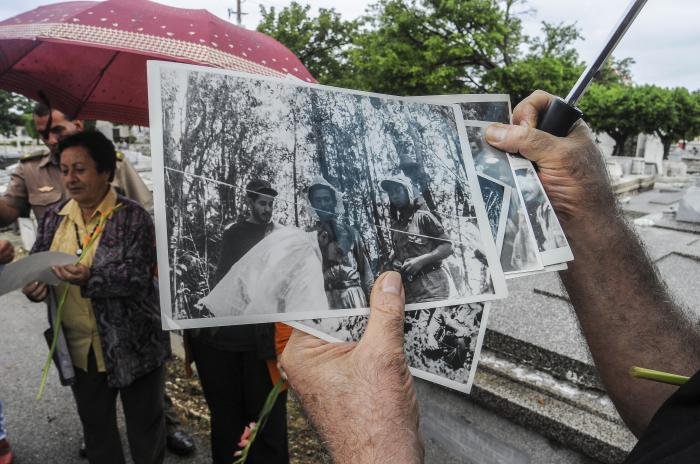
Jesus Christ, Revolutionary
Jesus Christ, Revolutionary
Frei Betto: Now, I’d like to hear your views on somebody else, somebody much more important, much more universal, and also much more discussed and much more loved than the pope. What are your views on Jesus Christ the person?
Fidel Castro: Well, I’ve already told you the story of my education and my contacts with religion, with the church. Jesus Christ was one of the most familiar names to me, practically ever since I can remember — at home, at school, and throughout my childhood and adolescence. Since then, in my revolutionary life — even though, as I told you, I never really acquired religious faith — all my efforts, my attention, and my life have been devoted to the development of a political faith, which l reached through my own convictions. I couldn’t really develop a religious concept on my own, but I did develop political and revolutionary convictions in that way, and I never saw any contradiction in the political and revolutionary sphere between the ideas I upheld and the idea of that symbol, that extraordinary figure that had been so familiar to me ever since I could remember. Rather, I concentrated on the revolutionary aspects of Christian doctrine and Christ’s thinking. Throughout the years, I have had several opportunities to express the coherence that exists between Christian and revolutionary thought.
“I’ve cited many examples; sometimes I’ve used Christ’s words: “It is easier for a camel to go through the eye of a needle than for a rich man to enter the kingdom of God.” I’ve heard various people, including a priest, say that Christ wasn’t referring to the small needle we know now, because it’s impossible for a camel to go through the eye of that kind of needle. Rather, it meant something else; it had to be interpreted differently.
Frei Betto: Some biblical scholars take, it to mean the narrow corners in Jerusalem, Palestine, and the heart of Beirut, for it was very difficult for the camels to turn those corners. Why doesn’t anybody question how difficult it is for a rich man to enter the kingdom of heaven? That’s unquestionable. Comandante, from the theological point of view, it doesn’t mean that Jesus discriminated against the rich; it means that Jesus opted for the poor. That is, in a society characterized by social inequalities, God decided to assume the likeness of Jesus; he could have been born in Rome, to a family of emperors; he could have been born to a Jewish landowner’s family; he could have been born to the middle strata of parishioners. Instead, he chose to be born among the poor, as the son of a carpenter — one who certainly worked on the construction of the Brasilia of his time, the city of Tiberias, built as a tribute to Emperor Tiberius Caesar in whose reign Jesus Lived. It’s interesting that Tiberias is on the banks of the Lake of Gennesaret, where Jesus spent most of his life and carried out most of his activities. In the Gospels, he doesn’t visit that city even once.
So, what do we say? We say that Jesus unconditionally opted for the poor. He spoke to everyone, both rich and poor, but from a specific social stand, from the social stand of the interests of the poor. He didn’t speak in a neutral, universalist, abstract way; rather, he reflected the interests of the oppressed strata of the times. If a rich man wanted to have a place next to Jesus, he had to opt for the poor. There isn’t a single example in all the Gospels of Jesus’ welcoming a rich man beside him without first making him commit himself to help the poor.
I can cite three examples: first, that of a rich young man who was a saint because he observed all the Commandments, but in the end Jesus said that the man had to do one more thing: go and sell what he had, and give to the poor before he could follow him. I believe that many priests today would say, “Look, If you observe all the Commandments, come with us; stay here next to us; and in time you’ll improve!” But since Jesus was a little more radical than we are, he told the man, “You go honor your commitment to the poor and then come.”
The second example is that of the rich man whose home Jesus visited. Jesus had no prejudices but he was consistent so he went to Zacchaeus’s home not to praise his ceramics, which may have come from Persia, or his Egyptian figurines, but rather to tell him that he was a thief because he’d stolen from the poor. And Zacchaeus, who wanted to be at peace with him, said, “Behold, Lord, the half of my goods I give to the poor; and if I have defrauded anyone of anything, I restore it fourfold.” That is, the practice of justice was the basic requirement for following Jesus.
The third example is the preaching of John the Baptist, who prepared for Jesus’ coming. His preaching began with the practice of justice. The people who wanted to be converted didn’t ask what they should believe; they asked what they should do and John replied, “He who has two coats, let him share with him who has none; and he who has food, let him do likewise.”
The universality of Jesus’ preaching must also be explained; it is a universality that derives from an option and a very specific social and political stand: the cause of the poor.
Fidel Castro: I’ve been listening to you with great interest, because there’s a lot of substance in what you’ve said, However, I could make a mathematical objection: a rich man could never give back four times what he’d stolen, because everything a rich man has must have been stolen. If he didn’t steal it himself, it must have been stolen by his parents or grandparents, so it’s impossible — if everything he has is stolen — for him to return fourfold what he’s stolen, for he’d probably have to steal four times as much again to keep that promise.
Frei Betto: You’re repeating something that St. Ambrose said in the early centuries.
Fidel Castro: I’m glad to have coincided with him. So what do I think? It may be a bad translation of the Bible; maybe the translators are to blame, because they didn’t take into account the meaning of the eye of a needle, I realize that many of the phrases in the Bible are related to that environment, to the society and customs of the times; but I don’t know how this could be proved in this case. Anyway, somebody well versed in religion, somebody well versed in languages, must have interpreted, with quite some grounds, that it was the eye of the needle that everybody knows about in our language, because we don’t know of any other, for the people in Spanish-speaking countries don’t knew the first thing about camels, even though we do have an idea of what camels are.
In any case I liked the interpretation that the translators gave to that phrase, as I understood it, and I also believe the interpretation is absolutely in keeping and is consistent with all the other things that Christ preached. First of all, as you said, Christ didn’t choose the rich to preach the doctrine; he chose 12 poor and ignorant workers — that is, he chose the proletariat of the times or modest self-employed workers, some of whom were fishermen. They were poor people, very poor, without exception, as you said.
At times I’ve referred to Christ’s miracles and have said, “Well, Christ multiplied the fish and loaves to feed the people. That is precisely what we want to do with the revolution and socialism: multiply the fish and the loaves to feed the people; multiply the schools, teachers, hospitals, and doctors; multiply the factories, the fields under cultivation, and the jobs; multiply industrial and agricultural productivity; and multiply the research centers and the number of scientific research projects for the same purpose.” At times I’ve referred to the parable of the rich man who employed several workers: he paid some of them one denarius for a full day’s work; to others he paid one denarius for half a day’s work; and to yet others he paid one denarius for half an afternoon’s work. The parable implies a criticism of those who didn’t agree with that distribution. I believe that it is precisely a communist formula; it goes beyond what we say in socialism, because in socialism each should be paid according to his capacity and work, while the communist formula is to give to each according to his needs. To pay a denarius to each one who worked that day implies a distribution more in keeping with needs, a typically communist formula.
Also, I believe that many of the passages of the preachings of Christ, such as the Sermon on the Mount, cannot be given any interpretation other than what you call the option for the poor. When Christ said, “Blessed are the poor in spirit, for theirs is the kingdom of heaven. Blessed are those who mourn, for they shall be comforted. Blessed are the meek, for they shall inherit the earth. Blessed are those who hunger and thirst for righteousness, for they shall be satisfied,” it is obvious that Christ didn’t offer the kingdom of heaven to the rich; he really offered it to the poor, and I don’t think that the preaching of Christ is also a case of mistaken translation or interpretation. believe that Karl Marx could have subscribed to the Sermon on the Mount.
Frei Betto: In St. Luke’s version, not only are the poor blessed, but the rich are damned.
Fidel Castro: I don’t know if the phrase is in any of the versions of that preaching. You say that it’s St. Luke’s version. The one I recall doesn’t damn the rich.
Frei Betto: That’s the St. Matthew one, which is better known.
Fidel Castro: Maybe that’s the one that was more convenient at the time, to bring us up in a more conservative spirit. You said something profound: that the difficulty lies in understanding how a rich man can enter the kingdom of heaven, if you consider many of the things that go with the mentality of the rich: insensitivity, selfishness, lack of solidarity, and even the sins of the rich in all spheres. I really believe that what a rich man had to do to be a good Christian and reach the kingdom of heaven was expressed clearly. It was stated repeatedly in Christ’s preachings.
You should also take into consideration that we read many books of history and literature – some written by laymen and others by clergymen – that reflected the martyrdom of the Christians in the early centuries. Everybody’s had the opportunity to learn about those events, and I think that one of the things the church felt most proud of during the years when I was a student – I remember this clearly was the martyrology of the early years and throughout the history of the church.
SCANNED FROM:
Fidel & Religion: Conversations with Frei Betto on Marxism & Liberation Theology; Castro Talks on Religion and Revolution with Frei Betto. Introduction by Harvey Cox. Simon and Schuster (1987), pp. 267-271
Tourism and Religion in the Caribbean
Tourism and Religion Go Hand-in-Hand in the Caribbean
By Manuel E. Yepe
Exclusive for daily POR ESTO! of Merida, Mexico.
http://manuelyepe.wordpress.com/
A CubaNews translation.
Edited by Walter Lippmann.
“Religious tourism is part of the Caribbean culture, and is also good business. The local religions of the beautiful islands of the Caribbean, from voodoo in Haiti to obeah in Jamaica and santería in Cuba, provide valuable cultural and historical information about the Caribbean. This type of tourism allows visitors to become acquainted with the main religious sites in the region that are also related to important historical events.” This is the recommendation of a paper published by the Italian magazine TTC Caribbean dedicated to the promotion of tourism to the region.
“The voodoo cult, born in Haiti, has for decades been a good theme for horror movies; but along with other Caribbean religious creeds, it has also become a real attraction for international tourism,” says the promotional article about tourism in the Caribbean Sea area.
In Bonaire –an island in the Leeward Antilles in the Caribbean Sea– churches, mosques and synagogues provide a comprehensive service in Papiamento, Dutch, English and Spanish.
In Anguilla, a guide to “Places of Worship” was published with a list of churches of the predominant religious denominations, their addresses and schedules.
In the Dominican Republic there is the “Route of Faith” consisting of a journey or pilgrimage that stops at many monuments and sites of religious significance for Catholics. It includes a visit to Santo Domingo, the city that experienced the first evangelization in America. In addition, there is the “Holy Hill Sanctuary” where Christopher Columbus ordered the first Christian cross to be placed in America.sz
In eastern Cuba, there is the temple of Our Lady of Charity, also known as the Virgin of El Cobre or Our Lady Virgin of Charity in honor of the Virgin Mary, pontifically designated as the Patroness of Cuba.
The image of the virgin in Cuba is enshrined in the Basilica that is the National Sanctuary of Our Lady of Charity of El Cobre, built in 1926. The sanctuary is in the picturesque village of El Cobre, very near Santiago de Cuba.
On December 20, 1936, Pope Pius XI granted a canonical coronation of the image of the virgin which was found at sea in the 17th Century.
The Caribbean has also become a frequently visited site by tourists as a destination for weddings and other religious ceremonies.
The opinion of experts, says the TTC digital magazine, is that the Caribbean needs to constantly innovate the tourist offers. Religions have a crucial influence in the popular culture and are a major attraction, but they are not sufficiently exploited in the Caribbean.
The religious tourism sector is strongly rooted in Europe where it is estimated that more than fifteen million people enjoy some kind of tourism of this nature every yar. In Latin America, there are several specialized tourist agencies in this sector.
Generally, the main motivations for religious travel are visits to shrines and holy places, as well as pilgrimages, visits to the tombs of saints, attendance and participation in religious celebrations, visits to religious leaders, eucharistic congresses, holy years, etc.
Traditional African religions in the Caribbean and Brazil can greatly benefit tourism in the area, in the same way that religions have promoted the movement of people to remote sites since ancient times.
Religious tourism, says TTC, may be the main reason for travelling, but it can also be part of a holiday trip and provide additional attractions to a destination.
Such is the case, for example, of millions of non-Catholic persons who visit the Vatican each year.
All this makes religious tourism a thriving business. Two years ago, the annual value of religious travel around the world was estimated at 18 billion dollars, involving 300 million travelers.
Religious tourism, unlike all other segments of the tourist market, has faith as its fundamental motivation. At present, the holy cities that have historically been the destination of pilgrimages –Jerusalem, Mecca or Rome– continue to be important tourist landmarks. Perhaps the Caribbean region could also be one soon. Why not?
August 5, 2016.
Subscribe to Blog via Email
| M | T | W | T | F | S | S |
|---|---|---|---|---|---|---|
| 1 | 2 | 3 | 4 | 5 | 6 | 7 |
| 8 | 9 | 10 | 11 | 12 | 13 | 14 |
| 15 | 16 | 17 | 18 | 19 | 20 | 21 |
| 22 | 23 | 24 | 25 | 26 | 27 | 28 |
| 29 | 30 | |||||



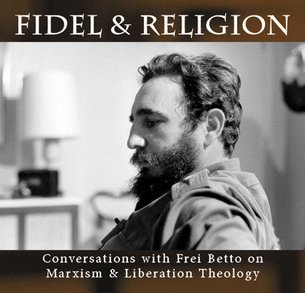
You must be logged in to post a comment.